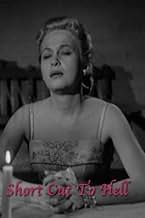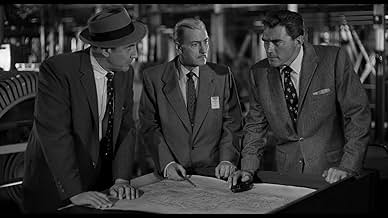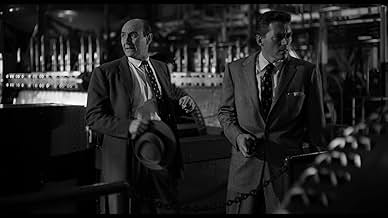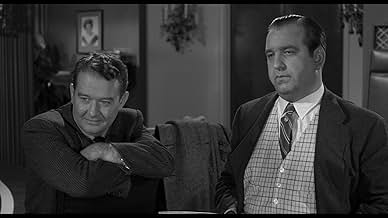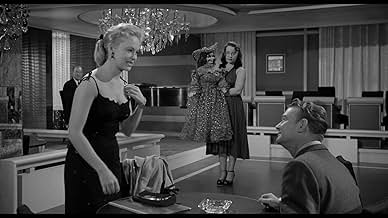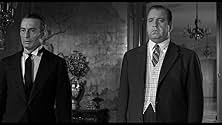अपनी भाषा में प्लॉट जोड़ेंA hired killer's latest contract goes awry when he's paid with stolen money and finds himself embroiled in a deadly cat-and-mouse game with those who hired him.A hired killer's latest contract goes awry when he's paid with stolen money and finds himself embroiled in a deadly cat-and-mouse game with those who hired him.A hired killer's latest contract goes awry when he's paid with stolen money and finds himself embroiled in a deadly cat-and-mouse game with those who hired him.
Larry Arnold
- Commuter
- (बिना क्रेडिट के)
Roscoe Ates
- Road Driver
- (बिना क्रेडिट के)
Joe Bassett
- Patrolman
- (बिना क्रेडिट के)
Jacqueline Beer
- Waitress
- (बिना क्रेडिट के)
Paul Bradley
- Train Passenger
- (बिना क्रेडिट के)
James Cagney
- Self - Pre-credits sequence
- (बिना क्रेडिट के)
Douglas Evans
- Mr. Henry
- (बिना क्रेडिट के)
Joseph Forte
- Ticket Seller
- (बिना क्रेडिट के)
Milton Frome
- LAPD Captain
- (बिना क्रेडिट के)
James Gonzalez
- Train Passenger
- (बिना क्रेडिट के)
फ़ीचर्ड समीक्षाएं
Story about an antisocial hired killer who goes after an employer who double crosses him. While tracking down the men who hired him he gets involved with the female lead a night club singer on her way to Los Angeles. In the end revenge is extracted.
It is fast paced and keeps your interest especially the first hour. When the action moves to LA it starts to bog down a bit and get a little squirrelly. There is a long scene in an air raid shelter of some huge giant factory that is completely implausible...dozens of police scour the plant for hours but overlook an obvious staircase to the airraid shelter??
Still it is worth a watch I give it a 6.
The other reviews are by people much more knowledgeable about the actors and period than I...am reviewing it as a naive uninformed viewer.
RECOMMEND
It is fast paced and keeps your interest especially the first hour. When the action moves to LA it starts to bog down a bit and get a little squirrelly. There is a long scene in an air raid shelter of some huge giant factory that is completely implausible...dozens of police scour the plant for hours but overlook an obvious staircase to the airraid shelter??
Still it is worth a watch I give it a 6.
The other reviews are by people much more knowledgeable about the actors and period than I...am reviewing it as a naive uninformed viewer.
RECOMMEND
An icy hit-man seeks revenge after being double-crossed by his employer.
Catch those early scenes with an over-heated Vickers (Daisy). I don't know what director Cagney told her, but she does everything except kiss the camera. Given the generally slack results, I can see why Cagney never again directed. The movie itself is spotty, at best, with an erratic script and uneven acting. Johnson (Glory) and Aubuchon (Barhwell) are fine; however, lead actor Ivers (Kyle) lacks the gravitas to carry off the merciless hit-man. He looks a little like Cagney, but is a long way from the latter's compelling charisma. (Note how the physically slight Ivers wears a bulky trenchcoat in most scenes.) Of the two leads, it's really Georgann Johnson who has the strong presence. Note too, the subtle hints that Bahrwell might well be gay, rather daring innuendo for the time.
Cagney's pretty good at staging. The industrial plant scenes are both eye-catchers and ominously suggestive. And I'm wondering whose lavish Hollywood estate was used for the finale. Speaking of the estate, the showdown is a lot tamer than I expected, given Bahrwell's slimy character. And shouldn't overlook the two execution scenes that are quite graphic, for the time. However, there are also two contrived implausibles—Glory donning Kyle's decoy outfit even though she's certain to get shot; plus, thug Nichols' (Vye) recovering quickly with hardly a mark after a savage beating. Neither is well thought out.
Not surprisingly, Johnson went on to a very respectable TV career, while it looks like Ivers never again had a lead role. Fortunately, Cagney went back to what he did best—acting. All in all, the movie fails to have any lasting impact despite the strong premise. It's definitely not the best version of novelist Greene's This Gun For Hire.
Catch those early scenes with an over-heated Vickers (Daisy). I don't know what director Cagney told her, but she does everything except kiss the camera. Given the generally slack results, I can see why Cagney never again directed. The movie itself is spotty, at best, with an erratic script and uneven acting. Johnson (Glory) and Aubuchon (Barhwell) are fine; however, lead actor Ivers (Kyle) lacks the gravitas to carry off the merciless hit-man. He looks a little like Cagney, but is a long way from the latter's compelling charisma. (Note how the physically slight Ivers wears a bulky trenchcoat in most scenes.) Of the two leads, it's really Georgann Johnson who has the strong presence. Note too, the subtle hints that Bahrwell might well be gay, rather daring innuendo for the time.
Cagney's pretty good at staging. The industrial plant scenes are both eye-catchers and ominously suggestive. And I'm wondering whose lavish Hollywood estate was used for the finale. Speaking of the estate, the showdown is a lot tamer than I expected, given Bahrwell's slimy character. And shouldn't overlook the two execution scenes that are quite graphic, for the time. However, there are also two contrived implausibles—Glory donning Kyle's decoy outfit even though she's certain to get shot; plus, thug Nichols' (Vye) recovering quickly with hardly a mark after a savage beating. Neither is well thought out.
Not surprisingly, Johnson went on to a very respectable TV career, while it looks like Ivers never again had a lead role. Fortunately, Cagney went back to what he did best—acting. All in all, the movie fails to have any lasting impact despite the strong premise. It's definitely not the best version of novelist Greene's This Gun For Hire.
This is the only film directed by James Cagney.
In Short Cut to Hell, Robert Ivers plays a hit man paid off with counterfeit money, bringing police to his door. He hops a train to Los Angeles and winds up kidnapping a young woman (Georgian Johnson) who is the girlfriend of a detective (William Bishop).
Very routine and I struggled to stay involved.
Growing up I loved the TV series It's a Great Life which starred Bishop. I suppose if I saw it now I would find it silly, who knows. Sadly he died young.
I had never seen Georgann Johnson as a young and pretty actress. She was a wonderfully talented character actress.
In Short Cut to Hell, Robert Ivers plays a hit man paid off with counterfeit money, bringing police to his door. He hops a train to Los Angeles and winds up kidnapping a young woman (Georgian Johnson) who is the girlfriend of a detective (William Bishop).
Very routine and I struggled to stay involved.
Growing up I loved the TV series It's a Great Life which starred Bishop. I suppose if I saw it now I would find it silly, who knows. Sadly he died young.
I had never seen Georgann Johnson as a young and pretty actress. She was a wonderfully talented character actress.
As B movies go, SHORT CUT TO HELL makes it pretty far. This is a tawdrier remake of Graham Greene's source novel for THIS GUN FOR HIRE with lower-rent sets, and lead actors less charismatic, but still very effective. In fact, it's the acting that most impresses about this odd little film. Robert Ivers embodies the diminutive, tightly wound hit-man pretty convincingly; his body language and hard-edged line deliveries are spot-on. Opposite him is Georgann Johnson, who has a disarming, natural acting style. The oil and water combination of these two sustains an interesting tension for the whole movie. Their first meeting aboard a train is a case in point: a very effectively played scene. Talented Johnson never made much of a mark until television later in the 50s and 60s. In the role of Bahrwell, Jacques Aubuchon is very well cast, as are Murvyn Vye and assorted other smaller roles, including Yvette Vickers and Douglas Spencer. Scarce prints of SHORT CUT TO HELL don't always include director James Cagney's spoken introduction and sometimes a jump cut suggests editorial trimming. A restored version of this film would do justice to Cagney's gift for directing actors and a couple of fine action sequences.
Peppermint-loving Jacques Aubuchon hires Robert Ivers to kill a couple of people, then pays him off with hot money. So Ivers boards the train to track down the guy who stiffed him. Seated next to Georgann Johnson, a singer who's heading to LA to work ina night club, he lifts a five-dollar bill from her. She catches it and demands her money back, then notices how hungry he is and splits a sandwich with him. Aubuchon is on the train, sees Iver, and calls the cops. Ivers forces Miss Johnson off the train with him, but they part company.... although their paths will soon cross again.
How did Jimmy Cagney come to make his sole movie as director with this remake of 1942's THIS GUN FOR HIRE? Good friend A. C. Lyles was producing it as his first picture and asked him to. It's not particularly distinguished, but then, neither was the first screen version. It's much more open in its sexuality, with a long moving shot focused on Yvette Vickers' rear as she sashays around Ivers' flop. Everyone is good, but no one is great, and lightning didn't strike the way it did with the first movie.
How did Jimmy Cagney come to make his sole movie as director with this remake of 1942's THIS GUN FOR HIRE? Good friend A. C. Lyles was producing it as his first picture and asked him to. It's not particularly distinguished, but then, neither was the first screen version. It's much more open in its sexuality, with a long moving shot focused on Yvette Vickers' rear as she sashays around Ivers' flop. Everyone is good, but no one is great, and lightning didn't strike the way it did with the first movie.
क्या आपको पता है
- ट्रिवियाJames Cagney's only directorial effort.
- भाव
[Kyle just told Glory that he's a professional killer]
Glory Hamilton: Is there anything you like about yourself?
Kyle: Yeah. I never miss.
- कनेक्शनReferenced in Here's Lucy: Lucy and Carol Burnett (1971)
- साउंडट्रैकI'm in the Mood for Love
(uncredited)
Music by Jimmy McHugh
Lyrics by Dorothy Fields
Performed by Danny Lewis
टॉप पसंद
रेटिंग देने के लिए साइन-इन करें और वैयक्तिकृत सुझावों के लिए वॉचलिस्ट करें
- How long is Short Cut to Hell?Alexa द्वारा संचालित
विवरण
- चलने की अवधि
- 1 घं 29 मि(89 min)
- रंग
- पक्ष अनुपात
- 1.85 : 1
इस पेज में योगदान दें
किसी बदलाव का सुझाव दें या अनुपलब्ध कॉन्टेंट जोड़ें

